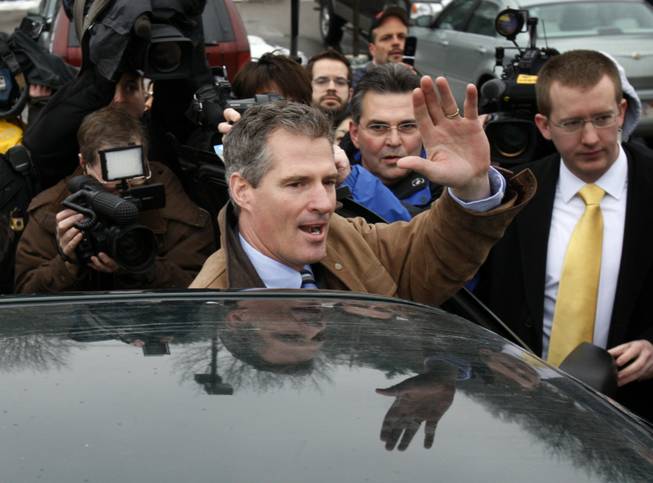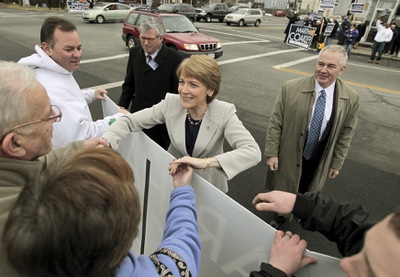
AP Photo/Robert F. Bukaty
Massachusetts State Sen. Scott Brown, R-Wrentham, waves to supporters after voting in Wrentham, Mass., Tuesday, Jan. 19, 2010.
Published Tuesday, Jan. 19, 2010 | 5:56 p.m.
Updated Tuesday, Jan. 19, 2010 | 7:20 p.m.
Sun Coverage
Sun Archives
- Tight Massachusetts race threatens Obama’s agenda, Harry Reid’s political future (1-19-10)
- Still on Reid’s side: Friends — and juice for Nevada (1-13-09)
- Harry Reid back at White House for health care talks (1-15-10)
- Can Harry Reid keep 60 Democrats? Analyst not so sure (1-14-10)
- Harry Reid, Obama negotiate health bill at White House (1-13-10)
- ‘Tea Party’ set turns out in Las Vegas at its anti-Harry Reid finest (1-13-10)
Sun Topics
In an epic upset in liberal Massachusetts, Republican Scott Brown rode a wave of voter anger to defeat Democrat Martha Coakley in a U.S. Senate election Tuesday that left President Barack Obama’s health care overhaul in doubt and marred the end of his first year in office.
The loss by the once-favored Coakley for the seat that the late Sen. Edward M. Kennedy held for nearly half a century signaled big political problems for the president’s party this fall when House, Senate and gubernatorial candidates are on the ballot nationwide.
Brown will become the 41st Republican in the 100-member Senate, which could allow the GOP to block the president’s health care legislation and the rest of Obama’s agenda. Democrats needed Coakley to win for a 60th vote to thwart Republican filibusters.
Obama spoke to both candidates late Tuesday and congratulated Brown on a "well-run campaign," White House spokesman Robert Gibbs said.
"The President told Senator Brown that he looks forward to working with him on the urgent economic challenges facing Massachusetts families and struggling families across our nation," Gibbs said.
Sue Lowden and Danny Tarkanian, the two leading Republicans seeking to oust Senate Majority Leader Harry Reid in November, were quick to congratulate Brown.
"His win – in one of the most Democrat-dominant states in the union – demonstrates how far out of touch, controversial and unpopular Harry Reid’s policies of higher taxes, higher debt and higher unemployment are for the nation," Lowden said in a statement. "This is an historic victory for real, common-sense solutions and yet another resounding wake-up call to Harry Reid. We can only wonder if he will finally decide to listen."
Tarkanian said, "Tonight, the people of Massachusetts have spoken for the people of America, including the grassroots voters of Nevada right here: No more bailouts. No more reckless spending. No more socialized health care. We're taking our country back."
Nevada Republican Party Chairman Chris Comfort will hold a conference call to discuss the special election and its implications for the 2010 midterm elections tomorrow.
Reid, meanwhile, welcomed Brown to the Senate in a statement released Tuesday night.
“While Senator-elect Brown’s victory changes the political math in the Senate, we remain committed to strengthening our economy, creating good paying jobs and ensuring all Americans can access affordable health care. We hope that Scott Brown will join us in these efforts," Reid said. "There is much work to do to address the problems Democrats inherited last year, and we plan to move full speed ahead."
Nevada Democrats were dialing for votes in the campaign to save Coakley, calling more than 52,000 Massachusetts residents in a get-out-the-vote effort to prevent a defeat that could imperil the Obama agenda.
Nevadans have been calling from party headquarters in Reno and Las Vegas, even their homes, since Friday, after receiving a plea of help to keep the seat held by the late Sen. Edward Kennedy out of Republican hands.
Coakley has been criticized for running a poor campaign for the seat many experts assumed would remain Democratic, and even top White House advisor David Axelrod admitted Tuesday that Scott Brown, the Republican state senator, had run a "very, very good campaign, a very clever campaign."
Meanwhile, congressional Democrats worked behind closed doors to salvage the health care bill, Obama’s top domestic priority and the signature issue for this Congress .
Without a 60-seat Democratic majority in the Senate, the bill can be blocked by Republican opponents – essentially dooming the bill Democrats have invested more than six months fighting to pass, as elected officials in Nevada and elsewhere face their own re-elections in fall.
"Our eye is on the ball of passing legislation," House Speaker Nancy Pelosi said Tuesday afternoon.
"Whatever happens in Massachusetts, we will have quality, affordable health care for all Americans -- and it will be soon."
Pelosi and Reid conferred briefly this afternoon in the Nevadan’s leadership office off the Senate floor before Reid headed to the White House for a meeting on other issues.
With Brown's win, options for Democrats to pass health care without Coakley are not pretty, dividing lawmakers as they try to choose the best of several unattractive options.
Rather than crafting a final bill that both chambers could agree to, one option would be to have the House simply pass the Senate’s bill, which would bring a swift resolution. Changes could be made later to resolve outstanding budgetary differences – particularly on tax issues that divide the two chambers -- via the reconciliation process that only requires 51 votes.
However, House Democrats balked at being asked to pass the Senate bill that contains various provisions they oppose.
Yet House Majority Leader Steny Hoyer suggested Tuesday that it "would be better than nothing," according to the Wall Street Journal and other reports.
Republicans are gearing up for a fight if Democrats try to pass a bill through both chambers before Brown can be seated.
"It’s clear that jamming this government takeover of health care through Congress will set off a political firestorm," said a spokesman for House Minority Leader John Boehner, the Republican from Ohio.
Obama campaigned in Massachusetts in an 11th-hour bid to prop up the ailing Coakley campaign. Axelrod, in a briefing on Tuesday with regional reporters, said "The White House did everything we were asked to do. Had we been asked earlier we would have certainly responded earlier."
Axelrod, however, declined to see the national mood souring for Democrats heading into fall, saying he believed the Democratic message that sent Obama to the White House still resonates with voters.
"I think there’s an awful lot of anxiety among middle-class Americans – it’s not exactly a revelation to us – it’s the reason we’re here," Axelrod said.
"People felt they weren’t being heard, felt their concerns were not the concerns of people here in Washington," he said.
"It is not enough to drive a truck if the truck isn’t headed in the right direction," he said. "It is not enough to articulate that anger and then come here to Washington and stand with the insurance companies, stand with the financial industry, stand with the special interests to maintain the status quo. That’s basically what the posture of the Republican Party here in Washington has been. We’re happy to have that debate."
Sun reporter Michael Mishak and the Associated Press contributed to this report.


Join the Discussion:
Check this out for a full explanation of our conversion to the LiveFyre commenting system and instructions on how to sign up for an account.
Full comments policy